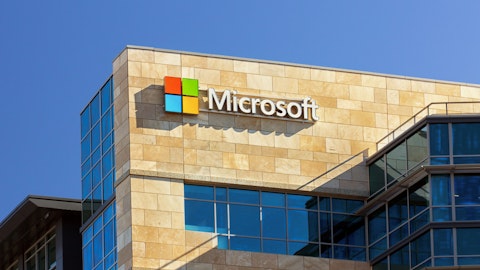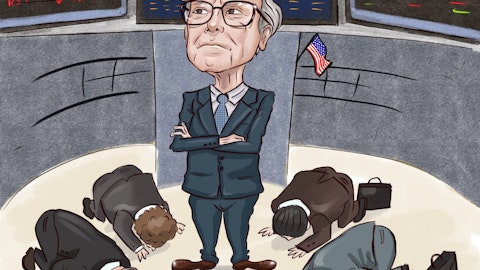Sachin Mehra: Craig, I would just add, like Michael said, right? I mean as you would imagine, in terms of how we think about 2024 and our thoughts for 2024, we do factor in what our best estimate as it relates to the conversion of the portfolios. What I’d tell you is, we’ve had a decent amount of wins across the globe. We for the most part, the sizable ones are staggered wins as and they come on over a period of time. They’re not episodic flips, which will take place all at one time. So for example, Citizens, Webster, UniCredit, Deutsche Bank, all of these will play out over the course of ‘24 and in some instances, over multiple years. So we factor in our best estimates on those conversions as we kind of put our thoughts together for the year.
Operator: Our next question comes from Sanjay Sakhrani with KBW.
Sanjay Sakhrani: Sachin, thank you for sort of cadence for the year with the first quarter. But I was just wondering, could you just elaborate a little bit more on the expectations for payments versus the value-added service revenues? And then specific to that Brazil tax legislation. I guess, is it neutral to EPS? It adds to OpEx, but lower taxes? Just maybe you could help us with that, too.
Sachin Mehra: Let me just take the Brazil one first, and I’ll come back to your second question. So on the Brazil piece, it increases our operating expenses because it’s an increase in indirect taxes, which are there. That is a — it’s more than offset in our tax rate and in the thoughts, we’ve given you from a tax rate standpoint. So from an overall EPS standpoint, it actually ends up being slightly accretive because of the more than offset, which is taking place on the tax line there. On your question around payments versus value-added services and solutions expectations. Look, we’re not giving specific guidance as it relates to how we see payment network revenue and value-added services and solutions revenue. But at the high level, here’s what I’d say.
Let me first address the value-added services and solutions piece. We continue to see good growth in our solutions around everything around our fraud and security solutions, our data analytics and insights, and we’re building all of those into our thoughts for the year. We’ve had a good year in 2023. We continue to see a good outlook for value-services and solutions going into 2024. Likewise, for payments, right? I mean as you can imagine, in payments, it’s a function of what we think will happen from a carded market volume growth rate standpoint and what the impacts will be from share wins as well as the impacts of rebates and incentives. So all of that kind of is factored in. What I would tell you broadly is that we continue to expect value-added services and solutions to grow at a faster pace than we do on the payment network side.
Operator: Our next question comes from Tien-Tsin Huang with JPMorgan.
Tien-Tsin Huang: Just thinking about the outlook. I think Harshita to ask it as well, just the outlook for growth between the U.S. and rest of world. Any — anything to call out there? Do you expect the trends observed in ’23 to be different in 2024 here between the two regions?
Sachin Mehra: Yes, Tien-Tsin, honestly, I would tell you from a secular opportunity standpoint, right? I mean, we continue to believe, broadly speaking, the secular opportunity is greater outside of the U.S. than it is in the U.S. There’s a good news, bad news story there. And the good news is that, that means we’ve been quite successful in driving the secular shift opportunity in the U.S., which is what you’re seeing in the results come through. And again, from a bad news standpoint is there’s a lower remaining opportunity on the volume side in the U.S. But if you ask me the question on a year-over-year basis, I would tell you, I don’t expect any meaningful shift in terms of suddenly the trajectory of how the secular opportunity is being realized between the U.S. and the rest of the world to be changing between ‘23 and ‘24.
Operator: Our next question comes from Dan Perlin with RBC Capital Markets.
Daniel Perlin: I heard you call out a couple of times geopolitical concerns, and I know that there’s some, I don’t know, 30 or 40 different elections happening around the globe. So my question to you is, as you think about managing those potential concerns, are there certain regions where you feel like there could be pockets of more nationalistic behavior, which would be problematic for you guys getting into those markets? Or that because of election years historically, what you’ve seen are that it kind of slows down adoption and some of the secular trends that you would have otherwise been able to enjoy in maybe a non-election year? So just trying to handicap what maybe some of those positives and negatives could be just geopolitically this year.
Michael Miebach: Dan, you just touched on some of the key things to watch out for. But this is no different than us monitoring fiscal monetary policy reactions by central banks and governments. So those are all things that affect consumer sentiment, potentially affect consumer spending. So we’ll just have to stay close to what that is. Our discipline around these things is to do some solid scenario planning and making sure our playbook in terms of managing our financial responsibility responsibly is up to date. Certainly, the last three years have had no shortages of such challenges, and we adapted quickly. More specifically to the points that you mentioned, elections happen regularly. So there is nothing dramatically new in 2024.
And geopolitical conflicts, they’ve been around, and they keep going. And that is something we’ll watch what is the impact on energy prices and various downstream into the broader economy. Yet again, our Economics Institute is keeping a focus on that. So nothing very specific. That’s why we kept it relatively high level. But these days, one has to just take a look left and right all the time.





